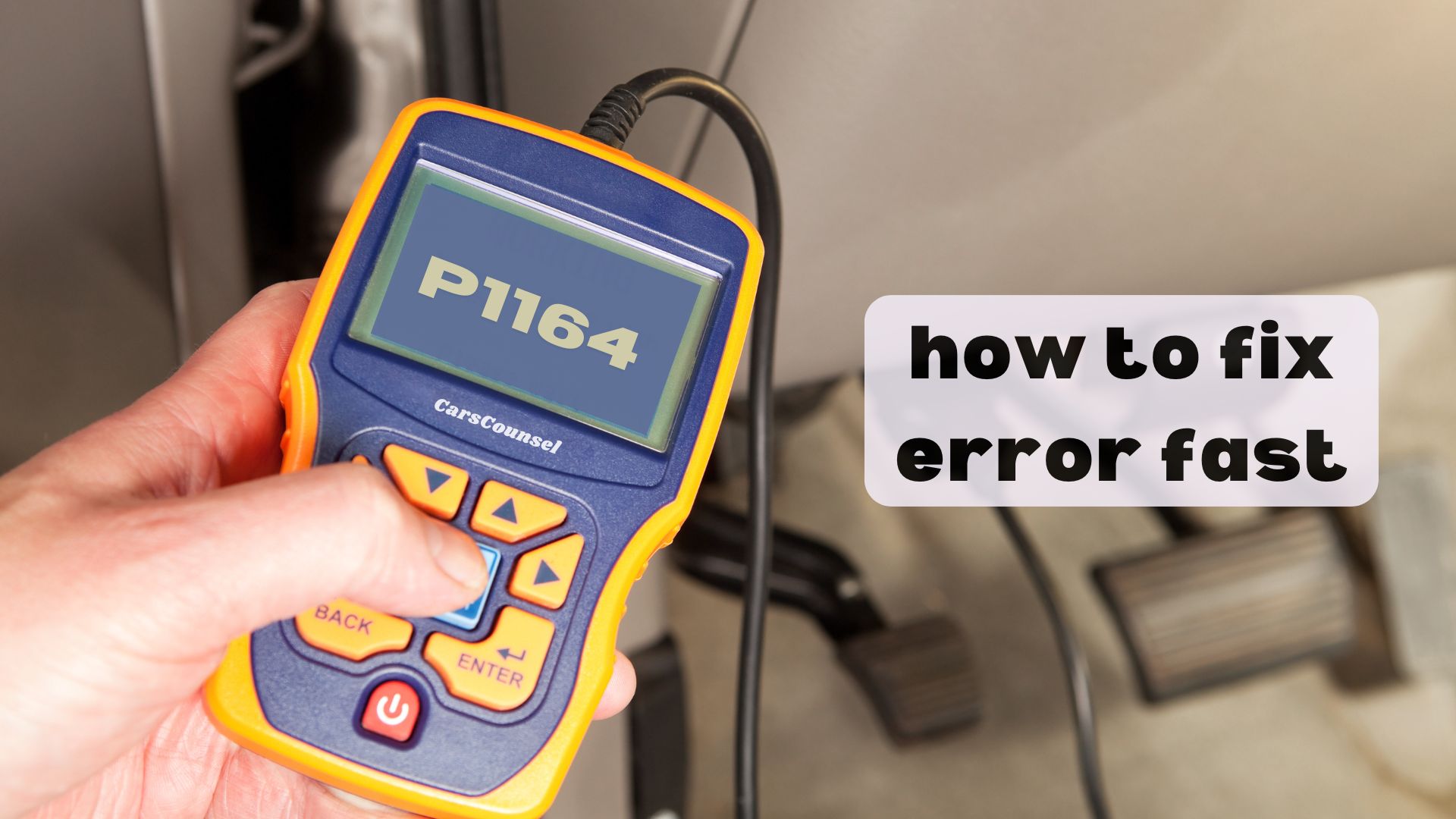You might not know that your engine relies on a precise air-to-fuel ratio to run smoothly, and a faulty sensor can disrupt this delicate balance.
The P1164 code indicates a problem with the Air/Fuel Ratio Sensor 1, which can lead to issues with engine performance, decreased fuel economy, and rough idling.
But what’s causing this sensor to malfunction? Is it a wiring issue, vacuum leak, or something more serious? You’ll need to dig deeper to find the root cause and prevent further damage to your engine.

Quick Navigation
Key Takeaways
- The P1164 code indicates a problem with the Air/Fuel Ratio Sensor 1, affecting engine performance, fuel economy, and emissions.
- A faulty sensor can cause issues like rough idling, stalling, and decreased fuel efficiency, and trigger the Check Engine Light.
- Common causes of the P1164 code include sensor failure, wiring problems, vacuum leaks, exhaust leaks, and ECM issues.
- To diagnose the code, scan the ECM for trouble codes, perform sensor troubleshooting, and inspect the sensor and wiring for damage or corrosion.
- Replacing the faulty Air/Fuel Ratio Sensor 1 with a matching original equipment specification can resolve the P1164 code and restore peak engine performance.
What Does the P1164 Code Mean?
When your vehicle’s onboard computer stores the P1164 code, it indicates a problem with the Air/Fuel Ratio Sensor 1 Range/Performance.
This sensor plays a vital role in monitoring the air to fuel ratio in your engine, ensuring perfect combustion and efficient performance.
A faulty sensor can disrupt fuel injection, leading to issues with engine performance, such as decreased fuel economy, rough idling, or stalling.
The P1164 code alerts you to address this problem, which, if left unchecked, can cause further damage to your engine and affect overall vehicle performance.
Common Causes of the P1164 Code
Five common culprits can trigger the P1164 code, and they’re all related to the Air/Fuel Ratio Sensor 1 or its surrounding components.
You’ll want to investigate these potential causes to diagnose the issue.
- Sensor Failure: A faulty Air/Fuel Ratio Sensor 1 can trigger the P1164 code.
- Wiring Issues: Wiring or connector problems can disrupt the sensor’s signal, leading to the error code.
- Vacuum leaks in the intake system: Leaks can affect the air/fuel ratio, causing the sensor to malfunction.
- Exhaust leaks before the sensor: Leaks can also impact the sensor’s readings, triggering the code.
- Issues with the ECM: Problems with the Engine Control Module can affect the sensor’s operation, leading to the P1164 code.
Symptoms of a Faulty Air/Fuel Ratio Sensor
Now that you’ve identified the common causes of the P1164 code, it’s time to examine the symptoms that’ll help you pinpoint the issue.
A faulty Air/Fuel Ratio Sensor can lead to decreased fuel economy, which may be the first sign of trouble. You might also experience engine hesitation, rough idling, or stalling.
Additionally, the Check Engine Light will likely illuminate, and emissions will increase. These symptoms can be frustrating, but they’ll guide your diagnosis and repair.
How to Diagnose the P1164 Code
To accurately diagnose the P1164 code, you’ll need to follow a structured approach.
Start by scanning the vehicle’s ECM for trouble codes and checking the sensor’s readings with a scan tool.
Then, perform sensor troubleshooting to identify the root cause of the issue.
- Check the Air/Fuel Ratio Sensor 1 for signs of damage or corrosion
- Inspect the wiring and connectors for any issues
- Perform Fuel injector cleaning to guarantee proper fuel flow
- Use a multimeter or oscilloscope to test the sensor’s operation
- Consult Factory Service Manuals for specific diagnostic procedures
Inspecting and Testing the Air/Fuel Ratio Sensor
Your Air/Fuel Ratio Sensor 1 inspection begins by visually examining the sensor, its wiring, and its connectors for signs of damage or corrosion.
Check the sensor connector for any signs of wear or rust, as this can affect the sensor’s performance.
Next, use a multimeter or oscilloscope to test the sensor’s operation, verifying its accuracy in detecting the air to fuel ratio.
This is vital for fuel mixture optimization, as a faulty sensor can lead to performance issues.
Confirm the sensor is providing accurate readings to the ECM, enabling it to adjust the air to fuel ratio for peak engine performance.
Replacing the Air/Fuel Ratio Sensor 1
The faulty Air/Fuel Ratio Sensor 1 must be replaced to restore peak engine performance and resolve the P1164 code.
This sensor plays a vital role in maintaining ideal air to fuel ratio, which directly impacts fuel efficiency. A faulty sensor can lead to decreased fuel economy, engine performance issues, and increased emissions.
- Verify you purchase a replacement sensor that matches the original equipment specifications.
- Disconnect the battery before starting the replacement process to prevent any accidental engine starts.
- Remove the sensor from its mounting bracket and disconnect the electrical connector.
- Install the new sensor and reconnect the electrical connector.
- Reconnect the battery and clear the trouble codes to test drive the vehicle.
Additional Causes and Considerations
What other factors could be contributing to the P1164 code on your vehicle? Besides a faulty Air/Fuel Ratio Sensor, issues with Fuel Pressure or Sensor Cleaning can also cause the code to trigger. Additionally, leaks in the intake system, exhaust leaks, or wiring/connector problems can contribute to the issue.
| Factor | Description | Impact |
|---|---|---|
| Fuel Pressure | Low or high pressure can affect sensor readings | Inaccurate air/fuel ratio detection |
| Sensor Cleaning | Dirty or corroded sensor can malfunction | Incorrect air/fuel ratio readings |
| Intake Leaks | Leaks in the intake system can disrupt air/fuel ratio | Inaccurate sensor readings |
| Exhaust Leaks | Leaks before the sensor can affect sensor accuracy | Incorrect air/fuel ratio detection |
| Wiring/Connectors | Damaged or corroded wiring/connectors can disrupt sensor signals | Inaccurate air/fuel ratio readings |
Repair Costs and Next Steps
One major consideration when addressing a P1164 code is the cost of repairs, which can vary widely depending on the make and model of your vehicle, the location of the repair shop, and the cost of replacement parts.
To get an accurate repair estimate, consider the following cost factors:
- Labor costs: $75 to $150 per hour
- Replacement part costs: $150 to $400 for the Air/Fuel Ratio Sensor 1
- Diagnostic fees: $50 to $100
- Additional repairs: vacuum leaks, wiring issues, or ECM problems
- Location: urban or rural areas may have different labor rates and part prices
More OBD-II Codes
| P1165 | P1170 | P1171 | P1185 |
| P1189 | P1187 | P1190 | P1215 |
| P1216 | P1217 | P1218 | P1219 |
| P1220 | P1228 | P1234 | P1237 |
| P1231 | P1240 | P1250 | P1286 |
| P1287 | P1288 | P1305 | P1395 |
Frequently Asked Questions
Can I Drive My Vehicle With the P1164 Code?
When driving with a faulty air/fuel ratio sensor, you’ll notice decreased fuel efficiency and potential engine performance issues. It’s recommended to exercise driving precautions, as rough idling or stalling can occur, but the risk of immediate engine damage is low.
Will a Faulty Air/Fuel Ratio Sensor Cause Engine Damage?
You’re wondering if a faulty air/fuel ratio sensor will cause engine damage. Yes, it can, as sensor degradation leads to fuel imbalance, resulting in premature wear on engine components, decreased performance, and potentially catastrophic engine failure if left unchecked.
Can I Clean the Air/Fuel Ratio Sensor Instead of Replacing It?
You’re wondering if cleaning the air/fuel ratio sensor is a viable option instead of replacing it. While sensor maintenance is vital, cleaning might not be enough; consider fuel injector cleaning as well, but if faulty, replacement is usually the most effective solution.
Will a Tune-Up Fix the P1164 Code Issue?
Revive your ride’s performance without breaking the bank! Unfortunately, a tune-up won’t fix the issue, as it only addresses spark plugs, fuel filters, and ignition wires. You’ll need to dig deeper, checking the fuel injector and air/fuel ratio sensor for faulty performance, to get your engine running smoothly again.
Can a Faulty Oxygen Sensor Cause a P1164 Code?
You’re wondering if a faulty oxygen sensor can cause a P1164 code. Yes, it can, as a sensor malfunction can affect fuel injection, leading to air/fuel ratio issues, which may trigger the P1164 code, indicating a range/performance problem.
Conclusion
“Fast fix your faulty fuel formula with a fresh sensor swap. Faulty air/fuel ratio sensors can foul fuel efficiency, forfeiting flawless function. Fear not, for following these fix-it steps, you’ll find and fix the flaw, fostering flawless fuel flow and fantastic performance. Flush faulty function, and fuel your ride with finesse.”

